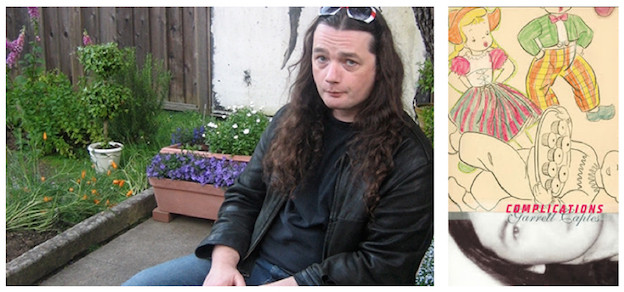Dear Garrett Caples

Complications
Complications
June 30, 2013
Dear Garrett Caples,
I wonder what the statute of limitations is for publicly responding to a book. Having just finished Complications, I looked at the copyright date and realized it was published in 2007. Mainstream book reviews run within a few weeks or months of the publication. Others usually within a year. Poetry seems to operate on an altogether different timeline, with reviews coming out within, say, two to three years of a book’s publication.
Perhaps it takes a lot longer to get a poetry book into someone’s hands. Perhaps because poetry and poetry book reviewing both operate on a gift economy, it is harder for someone to find the “free” time that they can “spend” reading and writing about a book. Perhaps poetry just has a longer shelf life than other forms of writing. To answer my own question, I guess there is no statute of limitations.
Since this isn’t a review, per se, I guess it’s a moot point.
It took me about a week to read Complications. We’d been having a very wet June here in Connecticut. It seemed like it rained all day every day throughout the month. And then the sun came out, and the temperature rose into the nineties. It’s now very humid. Your book is lying on my desk, and the moisture in the air has caused the cover to curl.
I began reading it before work. I wake at 6:30 every day and try to lock myself away to write for an hour or so. It’s not a lot of time, but I am freshest in the morning, so I can usually get a fair amount done. Trying to write at the end of the day or while I am at the office is next to impossible.
My usual breakfast is a smoothie made with home-brewed kefir, frozen fruit, flaxseed, and whey protein. I mix it all up in a blender, pour a cup of strong coffee, then head to my study. On this particular morning, I used peanut butter and ice instead of frozen fruit. The humidity in the study caused the glass to sweat. A modest drop of condensation slid off the side of the glass and wet the page I was reading. I drew a circle around the spot and noted the date, 6/24/13.
You were talking about how “buildings repeat / broken objects.”
I finished reading up to that poem before heading to work. The next morning, I noticed that there was already some water damage to the upper right-hand corner of pages 19–32. This damage occurs mostly to the poem “Synth.” I made a note of this. Then I left the room to get a cup of coffee.
It’s always a danger to leave the room in the morning. Anything can break my concentration. I managed to read a little further, but then my twenty-one-month-old daughter started banging on the door of my office screaming “Song, song, song!” She recently discovered that I keep my guitar hidden away in the closet of my study. She likes to strum it with a plectrum while I hold the chords down for her. That ended my concentration for the morning.
The last line I read was “poetrys / not a / job / its a set / of dentures.”
“A Young Girl Recalls Meeting Erich von Stroheim” made me think of Theatre 80 on St. Mark’s Place in New York. Most of what I know about film came from attending films there in the early nineties. The theater was run by an older couple, Florence and Howard Otway. I used to talk to Florence at the ticket window. Howard was not well at the time and eventually died. This was the end of the theater. The last film they showed was “Sunset Boulevard.” I also remembered the image of the cracked desert floor near the end of Stroheim’s Greed.
In the midst of all of this, the Voting Rights Act was gutted, and DOMA was declared unconstitutional. This happened just before I read the poem “Ordinary History America.”
It’s funny how information sometimes begins to accumulate. The more focused you become on a subject, the more you notice its presence everywhere. This same week you published a response to Kenny Goldsmith’s “Printing the Internet” exhibition. I probably would not have noticed the essay online had I not been reading your book.
I read the long last poem on 6/28/13. Given its one-word-per-line structure, I thought it would be a quick read, but it took me quite a while to get through it. One-word lines remind me of a bass drum pounding over and over and over. Boom boom boom boom!
The thumping became knocking, and I realized my daughter was again banging on the door of my study. I let her stand there for another minute while I read the last lines of the book, “puke / poem / keep / sake,” then I opened the door. “Song! Song! Song! Song!” she screamed.
So I took out my guitar and sang “Lost Highway” by Hank Williams.
Edited byLaura Goldstein Michelle Taransky